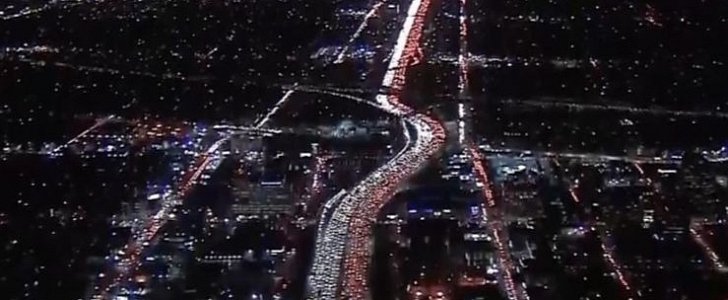Spending hours upon hours trapped in a car is a trait of modern human living. There is not a single big city on this planet that doesn’t experience regular traffic congestions, but some are a true nightmare to live and drive in.
On Monday, INRIX released its annual Global Traffic Scorecard, an analysis of traffic congestion in 1,360 cities across 38 countries. The 2017 report, which is the biggest of its kind ever released, is based on 500 Terabytes of data collected from 300 million connected cars and devices.
INRIX’s findings are mind-blowing. In a single year, an average driver spends up to five days stuck in traffic, and all of them burn $305 billion worth of fuel with the engines on idle. Of all the countries surveyed, the U.S. ranks the worst.
In top 25 most congested cities, the Americans have ten entries. The city of Los Angeles ranks the most gridlocked city in the world for the second year in a row, drivers there spending an average of 102 hours in congestion in 2017, during peak time periods. San Francisco ranks fourth, with 79 hours, closely following Moscow and New York (91 hours each), and Sao Paulo (86 hours).
For the U.S., the worst corridor to be traveling on is, for the third year in a row, the Cross Bronx Expressway in New York, a road which ate 118 hours of drivers’ lives last year. At the opposite end, the city of South Bend, Indiana, reduced the time spent by drivers in traffic by 25 percent in peak hours.
“Congestion costs the U.S. hundreds of billions of dollars, and threatens future economic growth and lowers our quality of life,” said Dr. Graham Cookson, Chief Economist at INRIX.
“If we’re to avoid traffic congestion becoming a further drain on our economy, we must invest in intelligent transportation systems to tackle our mobility challenges.”
Full details of the report can be found in the document attached below.
INRIX’s findings are mind-blowing. In a single year, an average driver spends up to five days stuck in traffic, and all of them burn $305 billion worth of fuel with the engines on idle. Of all the countries surveyed, the U.S. ranks the worst.
In top 25 most congested cities, the Americans have ten entries. The city of Los Angeles ranks the most gridlocked city in the world for the second year in a row, drivers there spending an average of 102 hours in congestion in 2017, during peak time periods. San Francisco ranks fourth, with 79 hours, closely following Moscow and New York (91 hours each), and Sao Paulo (86 hours).
For the U.S., the worst corridor to be traveling on is, for the third year in a row, the Cross Bronx Expressway in New York, a road which ate 118 hours of drivers’ lives last year. At the opposite end, the city of South Bend, Indiana, reduced the time spent by drivers in traffic by 25 percent in peak hours.
“Congestion costs the U.S. hundreds of billions of dollars, and threatens future economic growth and lowers our quality of life,” said Dr. Graham Cookson, Chief Economist at INRIX.
“If we’re to avoid traffic congestion becoming a further drain on our economy, we must invest in intelligent transportation systems to tackle our mobility challenges.”
Full details of the report can be found in the document attached below.









